Moderator: Redaktörer
Svante skrev:*Suck*
galder skrev:Verkar var svårt att få in att de har använt annan teknik för att skapa bättre ljud än högre bitrate, så det är ingen lösning.
Jag har inte sagt att mitt lyssningsförfarande är okritiskt, men duger för mig. Det enda möjliga sättet för mig att jämföra.
Vi får väl avvakta tills vi får se seriösa tester om det kan ge mer info.
Själv väntar jag otåligt på att hela Tidals katalog skall bli kodad med MQA-formatet. Plus att MQA snart också kommer att införas på Android-appen.
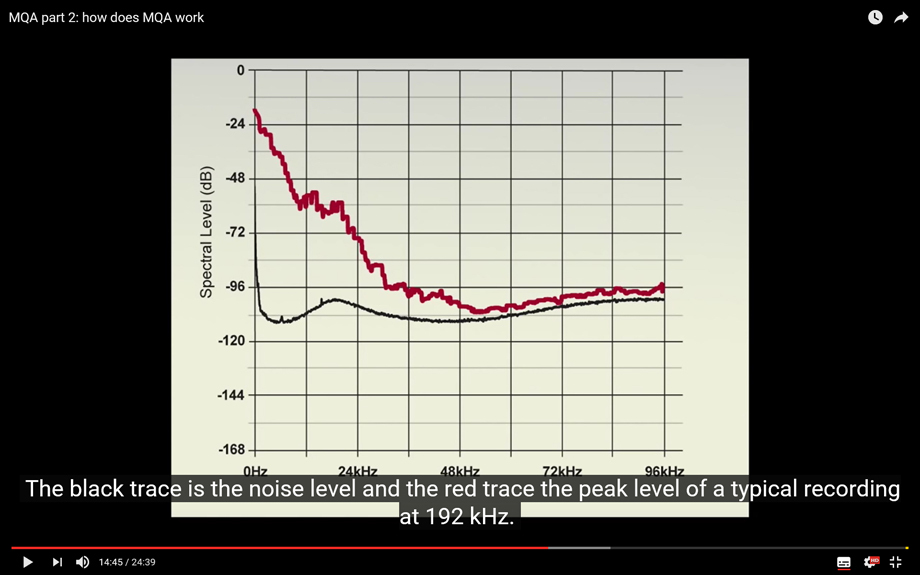
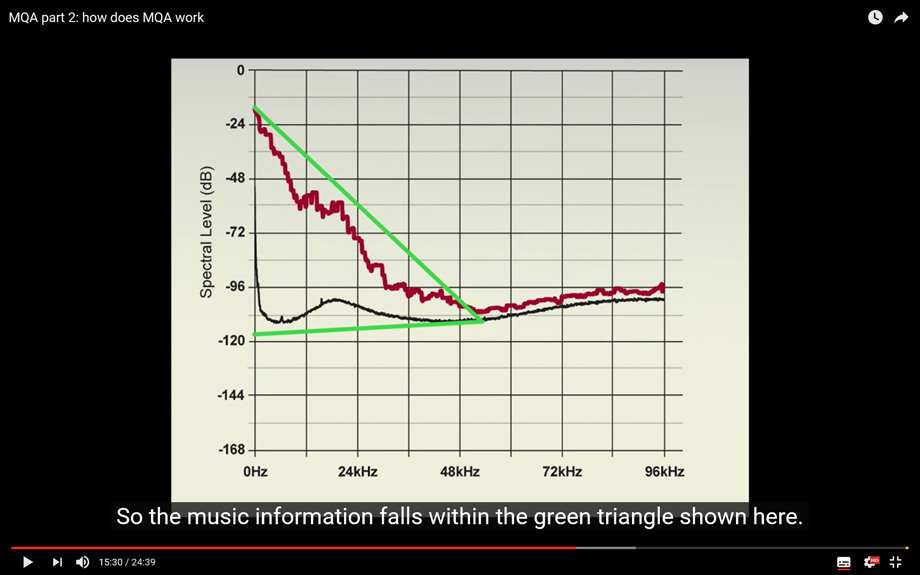
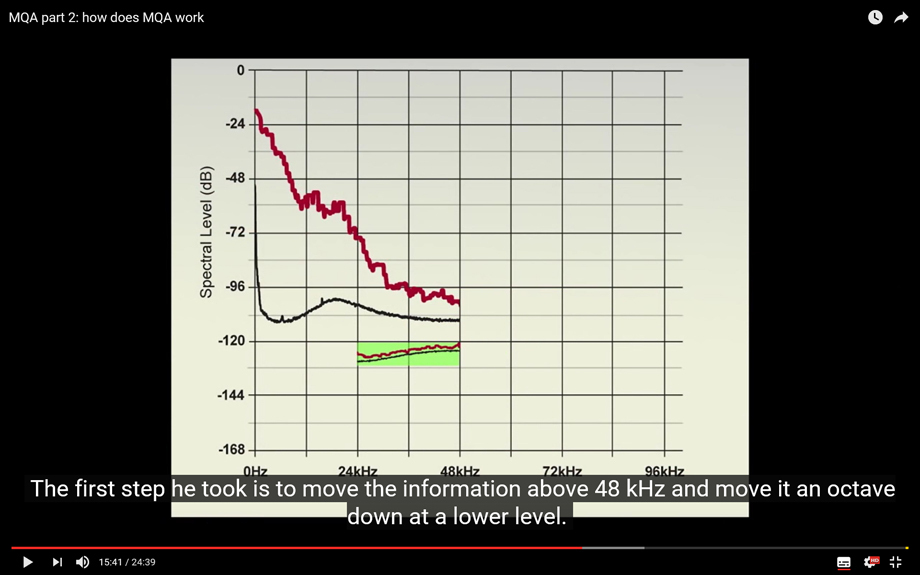
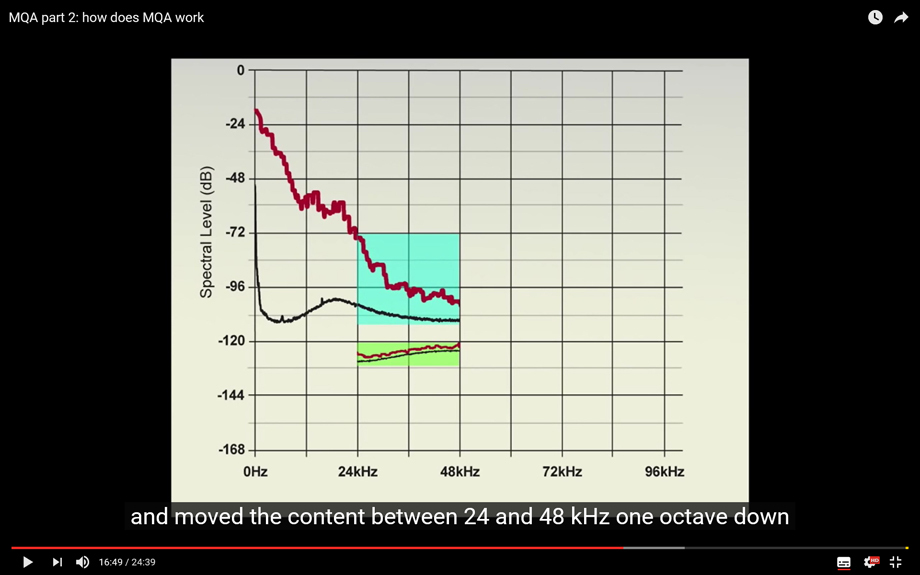
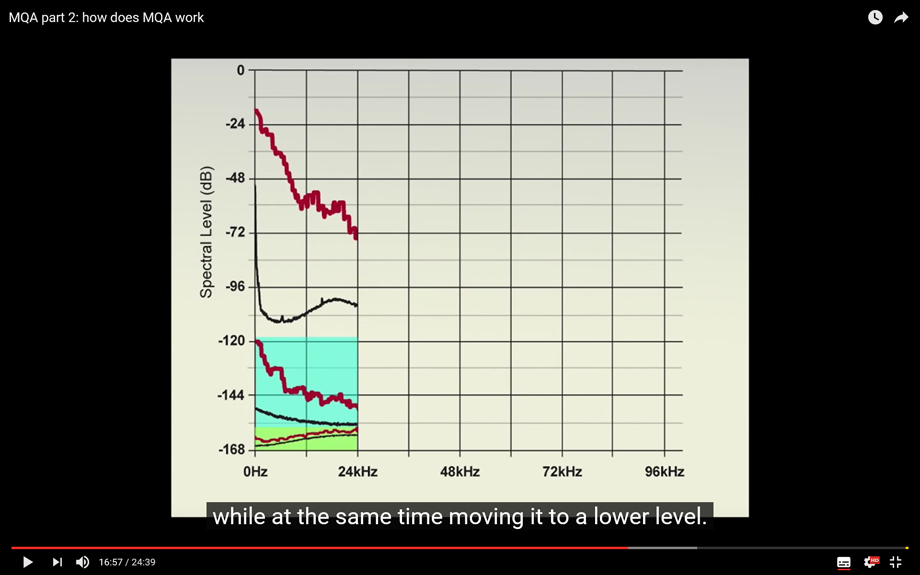
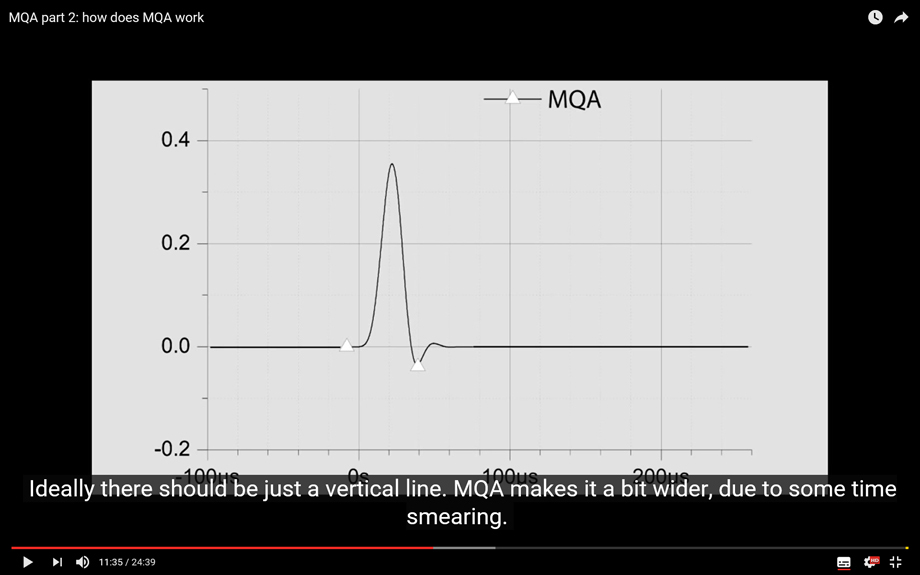
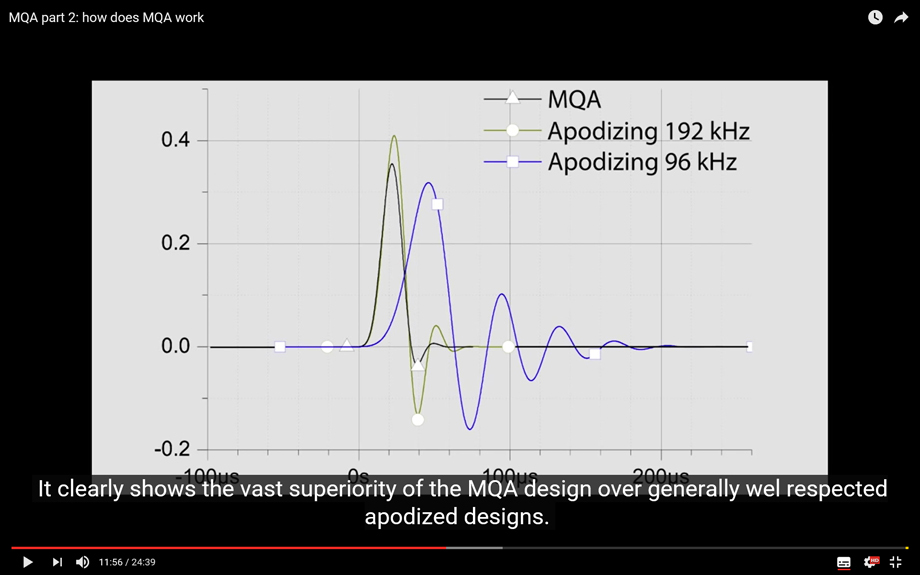
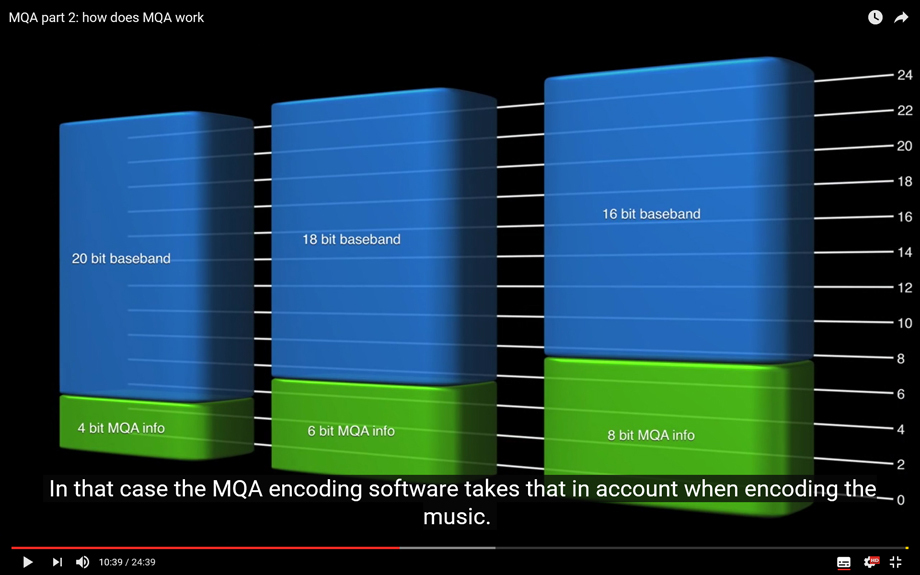

petersteindl skrev:Resultatet efter MQA kodning syns här. För mig framstår denna bild lite problematisk eftersom det innebär enligt denna bild information långt under -144 dB vilket skulle betyda mer än 24 bitar. Antingen har jag ett feltänk eller också har de som gjort bilden gjort ett misstag som sluppit igenom alla kvalitetskontrollinstanser hos Meridian.
petersteindl skrev:Här är en mätning som någon gjort där lite brus visas på olika system.
MQA vinner inte riktigt i området 8 kHz till 67 kHz, åtminstone om det inte skulle vara hög nivå på bruset man eftersträvar till 30 kHz.
Kohlrabi @ Hydrogen Audio skrev:My suspicion is the following: The filesize and bitrate will still be huge enough, so that audiophiles can be content about huge numbers on their displays. Audio quality will be worse than true 16 bit delivery, and maybe just bad enough to be noticeable on selected material, so that there is an incentive for people to buy the expensive meridian decoder hardware. This format only exists to intentionally deliver low fidelity music to consumers without Meridian hardware, to sell them expensive Meridian decoders.
Almen skrev:Men alltså, det är ju två år sedan det lanserades! Redan då hade vi en tråd om det: Meridian utlovar stor nyhet
Och redan då väntade man på någon matnyttig information - som ännu inte kommit, hör och häpna.
En skribent på hydrogen audio sammanfattade:Kohlrabi @ Hydrogen Audio skrev:My suspicion is the following: The filesize and bitrate will still be huge enough, so that audiophiles can be content about huge numbers on their displays. Audio quality will be worse than true 16 bit delivery, and maybe just bad enough to be noticeable on selected material, so that there is an incentive for people to buy the expensive meridian decoder hardware. This format only exists to intentionally deliver low fidelity music to consumers without Meridian hardware, to sell them expensive Meridian decoders.
sportbilsentusiasten skrev:- varför de vill låsa in kunderna i ett "proprietary" system, som leder till att kunder enbart kan åtnjuta den, enligt Meridian, bäst kvaliteten med deras utrustning (eller licensierad från Meridian)
Bill50x skrev:sportbilsentusiasten skrev:- varför de vill låsa in kunderna i ett "proprietary" system, som leder till att kunder enbart kan åtnjuta den, enligt Meridian, bäst kvaliteten med deras utrustning (eller licensierad från Meridian)
Ja, vad tror du? Varför vill företag överhuvudtaget låsa in sina kunder i egna system? Fråga Apple tex... I slutänden handlar det om att knyta kunden till sig så man kan tjäna pengar på dem, utan att de springer iväg och är otrogna. I Naims fall kan det ju vara så att det blir lättare att bevisa deras apparaters överlägsenhet eftersom bara de (och deras licenstagare) kan dra nytta av det nya filformatet.
Bill50x skrev:Personligen kommer jag aldrig börja om från början igen med ett nytt filformat, bättre än flac eller inte.
I have read the paper and was also present when it was presented. In the question and answer period following the presentation, Analog Devices' Bob Adams (designer of the first successful IC asynchronous sample rate converter for AD) pointed out that the shapes of the filters used in the study were pathologically selective compared to normal commercial practice, having a much longer impulse response (by about a factor of 4x) than filters commonly used. So the take-away from this paper, at least for me, is that one can design an audible linear-phase digital filter whose transition region is above 20 kHz if you make the impulse response long enough.
As for the use of RFDF dither in the 16-bit tests, this just seems bizarre to me because it is so contrary to good engineering practice.
From the paper:
"The frequencies of the transition bands were 23500-24000 Hz and 21591-22050 Hz, corresponding to the
standard sample rates of 48 kHz and 44.1 kHz respectively."
In normal commercial practice, the transition region is allowed to start at 20 kHz.
Piotr skrev:Här är den artikeln/studien som jag nämnde tidigare:
http://www.aes.org/e-lib/browse.cfm?elib=17497
Dvs. den där Meridian anser sig bevisa att vi till att börja med behöver mer än 16/44.1. Efter att dom där bevisat sitt case måste dom naturligtvis erbjuda en lösning på detta "problem".
Kritiken (saxat från tidigare tråden viewtopic.php?f=9&t=59859&full=1):I have read the paper and was also present when it was presented. In the question and answer period following the presentation, Analog Devices' Bob Adams (designer of the first successful IC asynchronous sample rate converter for AD) pointed out that the shapes of the filters used in the study were pathologically selective compared to normal commercial practice, having a much longer impulse response (by about a factor of 4x) than filters commonly used. So the take-away from this paper, at least for me, is that one can design an audible linear-phase digital filter whose transition region is above 20 kHz if you make the impulse response long enough.
As for the use of RFDF dither in the 16-bit tests, this just seems bizarre to me because it is so contrary to good engineering practice.
From the paper:
"The frequencies of the transition bands were 23500-24000 Hz and 21591-22050 Hz, corresponding to the
standard sample rates of 48 kHz and 44.1 kHz respectively."
In normal commercial practice, the transition region is allowed to start at 20 kHz.
Dom ser alltså ut att ha använt typer av filter och dither som man normalt inte använder i musiksammanhang. Argumenten från kritikerna är att om man använt accepterat sunda filter och dither så skulle studien se annorlunda ut. Detta skulle dock förmodligen inte bygga caset för MQA och det ser ut som man alltså möjligen valt imperfekt teknik för att kunna såga 16/44.1.
Not all pieces of music contain musical features that demonstrate these losses of transparency. Possible important features include echoes that give a sense of the physical space around the performers.
This Convention paper was selected based on a submitted abstract and 750-word precis that have been peer reviewed by at least two qualified anonymous reviewers. The complete manuscript was not peer reviewed. This convention paper has been reproduced from the author's advance manuscript without editing, corrections, or consideration by the Review Board.
Svante skrev:Edit: Man ska också komma ihåg detta:This Convention paper was selected based on a submitted abstract and 750-word precis that have been peer reviewed by at least two qualified anonymous reviewers. The complete manuscript was not peer reviewed. This convention paper has been reproduced from the author's advance manuscript without editing, corrections, or consideration by the Review Board.
Piotr skrev:Svante skrev:Edit: Man ska också komma ihåg detta:This Convention paper was selected based on a submitted abstract and 750-word precis that have been peer reviewed by at least two qualified anonymous reviewers. The complete manuscript was not peer reviewed. This convention paper has been reproduced from the author's advance manuscript without editing, corrections, or consideration by the Review Board.
Precis som vi pratade om tidigare i tråden. Det hela framställs vetenskapligt och "approved" då det ges ut av AES.
AES "friskriver" sig men har nog i de flestas ögon gett tumme upp för innehållet.
Känns ju högst märkligt att bara ett abstrakt och inte hela artikeln granskas.
http://www.aes.org/events/142/authors/cfp/ skrev:Categories
Authors may submit proposals in three categories:
1. Complete-manuscript peer-reviewed convention papers
2. Abstract-precis-reviewed convention papers
3. Synopsis-reviewed engineering briefs
Submitting a Proposal
Category 1 and 2 proposals are to be submitted electronically to the AES 142nd proposal submission site at www.aes.org/142nd_authors by 2017 January 9. Stop press: The proposal site will remain open through January 15, during which time authors can modify current proposals and submit new ones.
For the complete-manuscript peer-reviewed convention papers (category 1), authors are asked to submit papers of 4–10 pages to the submission site. Papers exceeding 10 pages run the risk of rejection without review. These complete-manuscript papers will be reviewed by at least two experts in the field, and authors will be notified of acceptance by 2017 February 13. Final manuscript with revisions requested by the reviewers have to be submitted before 2017 March 6. If rejected as a convention paper (Cat. 1), the proposal may still be accepted for categories 2 or 3.
For abstract-precis-reviewed proposals (Cat. 2), a title, 60-to 120-word abstract, and 500- to 750-word précis of the proposed paper must be submitted by 2017 January 9. Authors will be notified of acceptance by 2017 February 6, and the authors must submit their final manuscripts (4 to 10 pages) before 2017 March 16. If rejected from this category, the proposal may be still be accepted as an engineering brief (Cat. 3).
If a paper is longer than 10 pages, the author will be charged a fee of $25 for every page over 10.
Piotr skrev:Om du hör skillnad mellan A och B men inte mellan A och C kan det indikera att din DAC har hörbart olika prestanda beroende på sample rate (köp ny DAC).
Piotr skrev:En sak att ta hänsyn till vid jämförande utav 16/44.1 och säg 24/96 är att den DAC man använder kan ge olika prestanda. Man kan alltså tro att man hör skillnad på källmaterialet när man i själva verket hör skillnad i DAC'ens prestanda.
Belker skrev:"On the topic of MQA, we can say for sure that we won't support the standard. Without providing much info of behind the scenes talk, this was one of the weirdest interaction we ever got with a company trying to license their IP.. We had a perfect platform to get it up and running. The type of questions and attitude we got from the company was "interesting" to say the least.
Anyway, I'm afraid that it won't happen. Wishing them good luck!
Ogjort skrev:Hej intressanta tråden.
Jag har en undran som någon kanske kan svara på?
(den kanske har passerat någonstans - men att jag missat)
Utifrån det jag sett och läst från Meridian, så har jag tolkat det som att: för att uppnå alla de (påstådda) fördelarna med MQA
så måste även samplingen, alltså första A/D-steget utföras av en MQA-kodare. (de beskriver ju en specifik samplingsprocess).
Då uppstår det en som företaget tydligen kallar "MQA-certified" ljudfil. (med nyckel o hela millevitten)
Men om man "bara" utgår från en redan existerande konventionellt framställd högupplöst fil (t.ex. PCM 96/24) så innebär MQA-tekniken
"endast" en snålkodning för att krympa datamängden i FLAC-containern.
Har jag fattat helt fel?
Om inte - så verkar det ju helt orimligt att Tidal skulle ha över 30 000 MQA-filer, eftersom det fortfarande inte finns någon på marknaden tillgänglig
MQA A/D. (utanför Meridian alltså).
Med hopp om upplysning.
Anders O.
Svante skrev:Om jag har förstått det hela rätt.
Användare som besöker denna kategori: Inga registrerade användare och 16 gäster